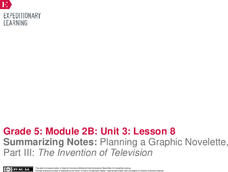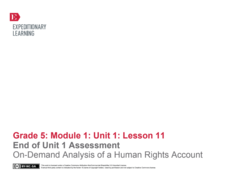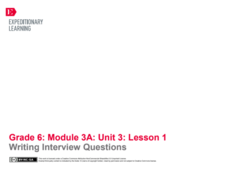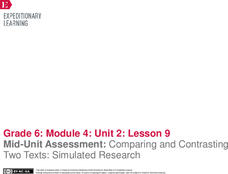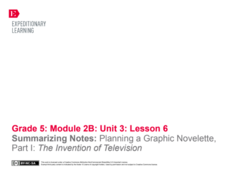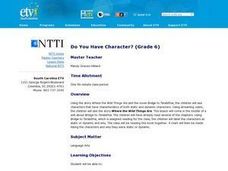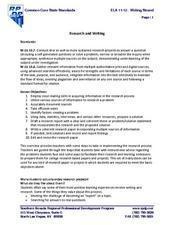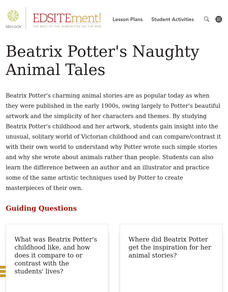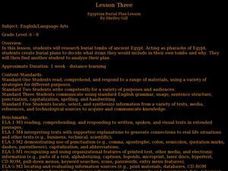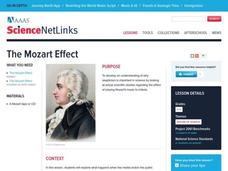EngageNY
Resource Materials and Gathering Information: Reading Another “Choice” Text from the Research Folder
Look it up. Scholars use a dictionary and thesaurus to verify the meaning of the research vocabulary words they defined in the previous activity. They then use sticky notes to write a synonym for each word. Finally, individuals choose a...
EngageNY
Summarizing Notes: Planning a Graphic Novelette, Part II: The Invention of Television
Let's work together! Using the collaborative resource, scholars work in triads to begin section two of their storyboards about Philo Farnsworth, the inventor of the television. They then practice using linking words and phrases to...
EngageNY
Summarizing Notes: Planning a Graphic Novelette, Part III: The Invention of Television
How did the television change people's lives? Learners consider the question as they complete their storyboards about the invention of the TV, adding visual elements along the way. Then, they participate in a peer review to offer and...
EngageNY
The Painted Essay for Opinion Writing: Developing a Conclusion and Adding Linking Words
Let's get colorful! Scholars use the Painted Essay technique to analyze and color code the conclusion of a model essay. Working in small groups, pupils then write a conclusion paragraph for their draft editorials about offshore drilling.
EngageNY
End of Unit 1 Assessment: On-Demand Analysis of a Human Rights Account
The last instructional activity in this unit about human rights consists of a final assessment. To demonstrate the skills your class has acquired throughout this unit, they will work with a new article entitled "From Kosovo to the United...
EngageNY
Writing Interview Questions
And now for the star witness! Scholars take a look at a model newspaper article and discuss the importance of eyewitness accounts. In groups of three, they take turns underlining text from eyewitnesses. They then regroup to talk about...
EngageNY
Mid-Unit Assessment: Comparing and Contrasting Two Texts: Simulated Research
Shoo fly. Scholars read DDT Spray Scares Mosquitoes Away, Study Finds and You Think You Have It Tough? to complete a mid-unit assessment. The learners compare and contrast author presentation and conduct a credibility check on each...
EngageNY
Summarizing Notes: Planning a Graphic Novelette Part 1: The Invention of Television
What's the story? Learners create the first of four storyboards about the invention of the television, incorporating narrative techniques and descriptive details. Next, they offer and receive feedback by participating in a peer critique...
EngageNY
End of Unit Assessment, Part II: Storyboard Draft, Sections 2 and 3
It's time to demonstrate knowledge. With the instructive resource, pupils complete the second part of the end of unit assessment. They develop sections two and three of their storyboards about an invention, add visual elements, and then...
EngageNY
End of Unit Assessment, Part III: Storyboard Draft, Section 4
Reflection is the best teacher. Using the resource, scholars complete the final part of their end of unit assessment, the fourth section of their storyboard about an invention. Next, they track their progress using a self-reflection form.
EngageNY
Final Performance Task: Presenting Graphic Novelettes
Let's get graphic. Serving as the final performance task of the unit, scholars complete their graphic novelettes and design covers based on their sketches. Finally, they present their hard work to classmates.
EngageNY
Mid-Unit Assessment: Analyzing a New Narrative about a Natural Disaster, Part II
See it through my eyes. Scholars complete mid-unit assessment part II by writing an essay describing how the narrator's point of view influences how the story is told in the text In the Middle of the Storm. Pupils also complete a...
Curated OER
What is a Philanthropist?
What does a philanthropist do? Help your class explore philanthropy using character development and literacy ideas. Learners will define and give examples of philanthropy, listen to The Lion and the Mouse, discuss how the characters help...
Curated OER
Do You Have Character?
Sixth graders read Katherine Paterson's novel, Bridge to Terabithia, and watch a video of Maurice Sendak's book, Where the Wild Things Are. They examine the characters in both stories that share similar characteristics. Students use the...
Curated OER
Using Punctuation Correctly
A PowerPoint presentation outlines the basic rules for correct comma usage. Viewers then edit texts for correct comma usage, identify which rules are being addressed, and complete worksheets as needed. The PowerPoint is included;...
Southern Nevada Regional Professional Development Program
Vocabulary Activity
Talk about a menu! Who would have thought SAT prep could be so delicious? Treat your class to a full course of SAT words with a timed activity that asks groups to create clues for dishes on their bill of fare. Distained veggies anyone?...
Southern Nevada Regional Professional Development Program
Was Bias A Factor? Make an Argument
The ability to analyze an argument is a skill emphasized by the Common Core standards. Offer your class an opportunity to develop and hone their skills by providing them the testimonies in an Oregon court case. After reading the facts of...
Southern Nevada Regional Professional Development Program
Common Core Reading Standards: Understanding Argument
What does your class know about logical fallacies? They can find out quite a bit and practice identifying logical fallacies if you follow the steps and use the resources provided here! After reviewing ethos, pathos, and logos, ask small...
Curated OER
Can You Haiku?
Everyone loves haikus! They're short, quick, and fun to write! Analyze the rules and conventions of haiku. Readers interpret examples of haiku and develop a vocabulary for writing haiku. Then they compose a haiku based on a personal...
Curated OER
Joyful Noise: Poems for Two Voices by Paul Fleischman
Do your young readers know that poems can be performed as a team? They listen to a few examples from Paul Fleischman's book Joyful Noise: Poems for Two Voices, paying attention to how the how readers work together. They examine the...
Southern Nevada Regional Professional Development Program
Researching and Writing
Designed for teachers, this resource identifies problems learners face when attempting a research project and approaches instructors can use to help their class members overcome these obstacles. Suggestions are included for how to help...
Curated OER
Beatrix Potter's Naughty Animal Tales
Students gain insight into the unusual, solitary world of Beatrix Potter's Victorian childhood and can compare/contrast it with their own world to explain why Potter wrote such simple stories and why she wrote about animals rather than...
Curated OER
Egyptian Burial
Students research burial tombs of ancient Egypt. Acting as pharaohs of Egypt, students create burial plans to decide what items they would include in their own tombs and why. They find another student to analyze their plan.
Curated OER
The Mozart Effect
Students develop a concept of why skepticism is important in science by looking at actual scientific studies regarding the effect of playing Mozart's music to infants. They record a journal of their inner thoughts and feelings while...
Other popular searches
- Autumn Lessons Ela
- Ela Lessons Grammar
- Spring Ela Lessons
- Biography Ela Lessons
- 4th Grade Ela Lessons
- Esl Ela Lessons
- Sequenced Ela Lessons
- Elementary Ela Lessons
- 7th Grade Ela Lessons
- 6th Grade Ela Lessons
- Ell Ela Lessons




